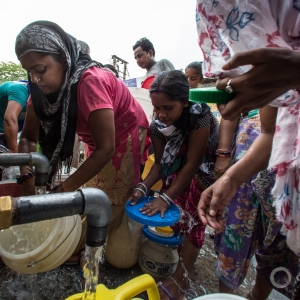The Stream, November 20, 2020: Flint Water Settlement Larger Than Originally Thought
GLOBAL DAILY WATER NEWS
- Flint, Michigan residents could receive up $641 million settlement in relation to the Flint water crisis.
- South African scientists try to find new ways to monitor potential Covid-19 outbreaks in non-sewer wastewater.
- Residents in Jackson, Mississippi sue the city for high water bills.
- The Chaffee County board of commissioners in Colorado will conduct an economic analysis of Nestlé’s proposal to bump and bottle millions of gallons of water from the Arkansas River Valley.
Hurricane Iota tears through Central America.
“We are in the hands of God. If I have to climb up trees, I’ll do it.” – Jaime Cabal Cu, a farmer in Guatemala’s Izabal province. Hurricane Iota has wreaked havoc across Central America, a region still feeling the impact of Hurricane Eta just two weeks ago. After Iota hit the Nicaraguan coast as a Category 4 hurricane Monday night, it weakened to a tropical storm, Al Jazeera reports. However, heavy wind and rains still pounded countries like Honduras and Guatemala. Authorities said around 120,000 people in both Nicaragua and Honduras has been evacuated from their homes.
IN RECENT WATER NEWS
North Carolina Panel Designates Financially Distressed Water and Sewer Systems
North Carolina officials took a decisive step on Wednesday in a years-long process to identify financially struggling water and sewer providers and assist them in a transition toward financial stability and reliable service.
The State Water Infrastructure Authority designated four local governments as “distressed,” a label that unlocks assistance from a $9 million fund established by the General Assembly and approved by Gov. Roy Cooper in July.
South African Scientists Find Ways to Monitor Non-Sewer Wastewater to Track Covid-19
Less than 10 percent of sub-Saharan Africa is connected to a sewer network, Quartz Africa reports. So, as countries around the world turn to wastewater surveillance to monitor potential Covid-19 outbreaks, the South African Water Research Commission (WRC) is trying to find another way to track the virus. Over the next seven months, WRC scientists hope to refine the sampling process for non-sewer wastewater, including rivers and surface runoff sites. The WRC is hoping to perfect the program before the next wave of Covid-19 hits South Africa and is sharing its findings with other African countries so that they can create similar programs.
TODAY’S TOP WATER STORIES, TOLD IN NUMBERS
3 YEARS
Residents in Jackson, Mississippi have filed a federal lawsuit against the city over excessive water bills. The Clarion Ledger reports that the lawsuit, filed last week, claims the city of Jackson provided defective water meters, failed to operate its new water meter system correctly and provided inaccurate water bills, if a water bill was provided at all. Many residents of the city, where the poverty rate is close to 30 percent, have complained over the last three years of high water bills. This new lawsuit seeks class action status for impacted residents, along with unspecified compensatory damages to be proven at trial, among other demands.
In context:
$641 MILLION
Officials revealed Tuesday that Flint, Michigan residents affected by lead-tainted water could receive about $641 million as a result of a proposed lawsuit settlement. The Associated Press reports that the state of Michigan offered $600 million to settle the case in August. Now, McLaren Regional Medical Center and the engineering and environmental services firm Rowe Professional Services have also agreed to settle instead of litigate. If the settlement is accepted by the court, it would excuse the state of Michigan, the city of Flint, McLaren and Rowe from pending civil litigation related to the water crisis.
ON THE RADAR
The Chaffee County board of commissioners in Colorado announced they are hiring an economic analysis firm to study the economic impacts of Nestlé’s proposal to pump as much as 65 million gallons a year from the Upper Arkansas River Valley for bottling in Denver, the Colorado Sun reports. The company began drawing water from the valley in 2009 as part of a 10-year permit, and asked for a renewal of that permit last year. After delays due to the coronavirus pandemic, the county began review of the request in October. The commission has held several meetings over the last two months, including hours of public comment that by-and-large opposed the plan.
Jane is a Communications Associate for Circle of Blue. She writes The Stream and has covered domestic and international water issues for Circle of Blue. She is a recent graduate of Grand Valley State University, where she studied Multimedia Journalism and Women, Gender and Sexuality Studies. During her time at Grand Valley, she was the host of the Community Service Learning Center podcast Be the Change. Currently based in Grand Rapids, Michigan, Jane enjoys listening to music, reading and spending time outdoors.






Leave a Reply
Want to join the discussion?Feel free to contribute!